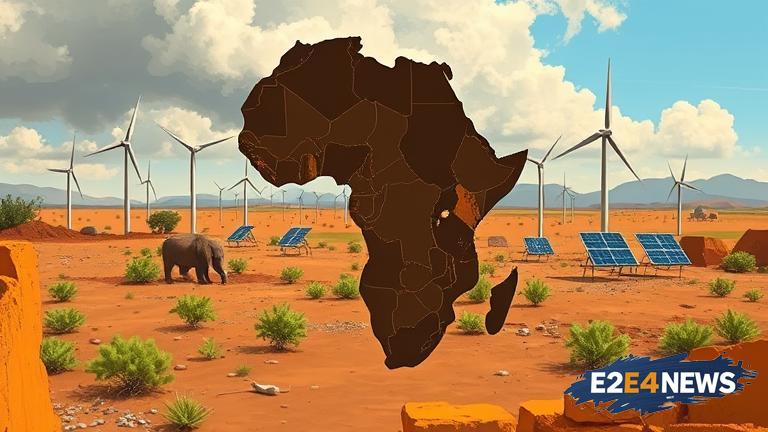The African continent is witnessing a significant shift towards renewable energy, driven by the need to address the pressing issues of energy access, energy security, and climate change. With many countries still struggling to provide electricity to their populations, renewable energy has emerged as a viable solution. Solar and wind power are becoming increasingly popular, with countries like South Africa, Egypt, and Morocco leading the way. The cost of renewable energy technologies has decreased dramatically over the years, making them more competitive with fossil fuels. This has led to a surge in investment in the sector, with many international companies and organizations committing to support Africa’s renewable energy ambitions. The African Union’s Agenda 2063 has set a target of ensuring access to clean and affordable energy for all Africans by 2030. To achieve this goal, the continent will need to increase its renewable energy capacity significantly. Several countries have already made significant progress in this regard, with Kenya, for example, aiming to generate 70% of its electricity from renewable sources by 2025. Rwanda has also set an ambitious target of becoming a carbon-neutral economy by 2050. The use of renewable energy is not only good for the environment, but it also has numerous economic benefits. It can create jobs, stimulate local economies, and reduce dependence on imported fossil fuels. Furthermore, renewable energy can help to improve energy access, particularly in rural areas where traditional grid extension may not be feasible. In addition to solar and wind power, other forms of renewable energy such as hydro, geothermal, and biomass are also being explored. The development of renewable energy in Africa is not without its challenges, however. Financing remains a major obstacle, with many projects struggling to secure funding. Infrastructure constraints, such as limited transmission and distribution networks, also need to be addressed. Nevertheless, the potential for renewable energy in Africa is vast, and the continent is well on its way to becoming a global leader in the sector. As the world transitions towards a low-carbon economy, Africa is poised to play a significant role. The continent’s renewable energy revolution is not only good for the environment, but it also has the potential to drive economic growth, improve energy access, and reduce poverty. With the right policies, investments, and partnerships in place, Africa can unlock its full renewable energy potential and achieve a sustainable energy future. The international community has a critical role to play in supporting Africa’s renewable energy ambitions, through financing, technology transfer, and capacity building. By working together, we can ensure that the benefits of renewable energy are shared by all, and that the continent achieves its development goals in a sustainable and equitable manner. The future of energy in Africa is renewable, and it is an exciting time for the continent as it embarks on this journey towards a cleaner, greener, and more sustainable energy future.
